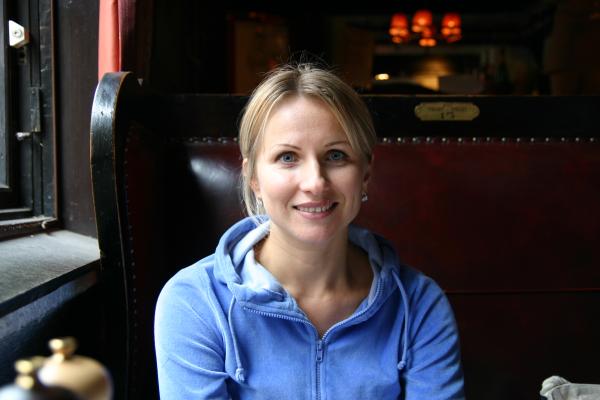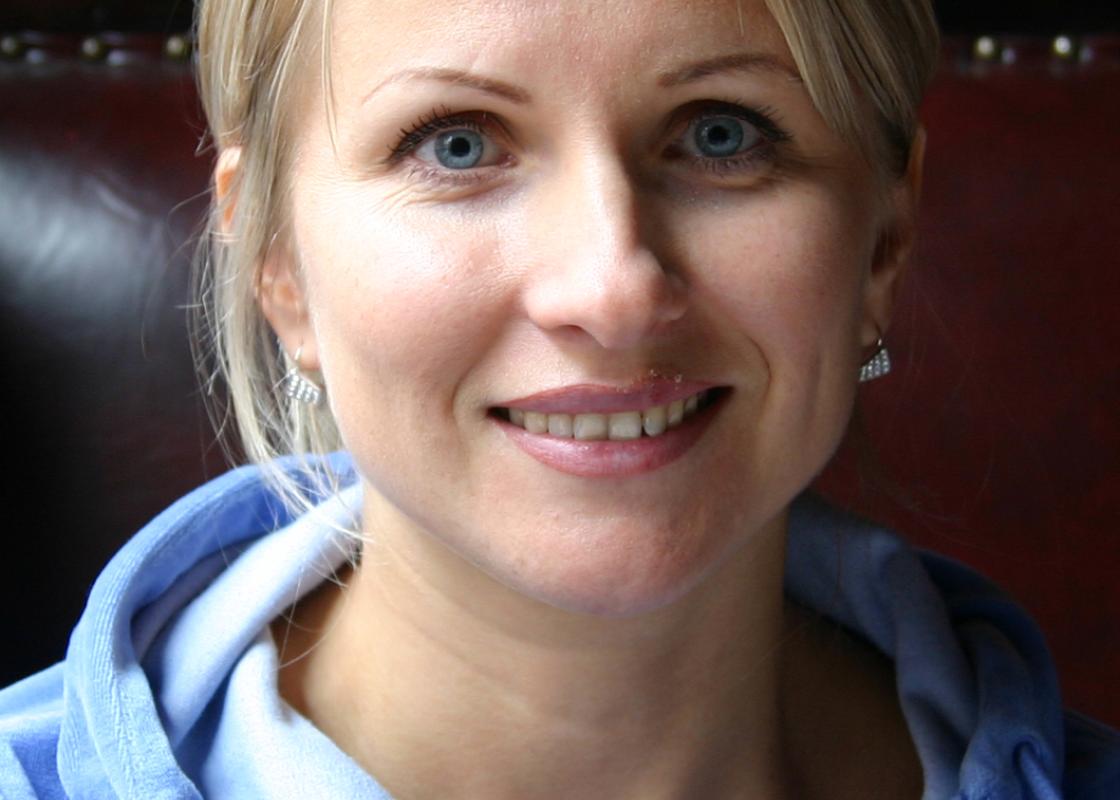
15 women from Eastern Europe have shared their experiences with her: They have talked about their lives back home, why and how they left their family and friends, and what it is like to be a prostitute in Norway. The result is a master’s thesis in sociology called “Unge jenter tilbys jobb i utlandet – en kvalitativ studie av transnasjonal prostitusjon til Norge fra Øst-Europa» (Young girls are offered jobs abroad – a qualitative study of transnational prostitution to Norway from Eastern Europe). The stories of the women vary, and Polyakova uses theories on migration, prostitution, and power to understand their choices and preconditions.
– The title is representative of those who come here, she says.
The wording is borrowed from a job ad that one of her informants, Ina from Estonia, saw in a newspaper one day. Common to the women is that they are young, want to go West, and want a good income.
Polyakova is herself originally from Russia and five years ago she was offered a job at the Pro Centre in Oslo (a Norwegian national resource centre on matters related to prostitution and a social service centre for women and men in prostitution.). Eastern European prostitutes were observed in Oslo and the Pro Centre needed an intermediary who spoke Russian and who could give the women basic information about Norwegian society. When she needed to decide on a topic for her master’s thesis, the choice was simple:
– I already had an open relationship with many of the women because of my job, and I felt that it was important to tell their stories. I had to consider whether it would be a violation of trust to assume the role of a researcher, but the women accepted it and are anonymous, says Polyakova, who currently is a special consultant with the Church City Mission.
Fifteen stories
The thesis is based on in-depth interviews with women from Lithuania, Estonia, Latvia, Russia, and Moldova, who work on the street or from an apartment. Polyakova put together a group of women from different countries, with different backgrounds, migration stories and experience as prostitutes. She documents their socioeconomic background and the social relations they have entered into to be able to leave their country and move to Norway. She also analyses the types of force that the women are exposed to by being both migrants and prostitutes. In this regard she points to the difference between women from the new EU countries and those from non-EU countries.
– Some have arrived here from the Baltic republics, without a visa, while others from countries like Moldova have a much more complicated migration story, she explains.
She wants to convey that human trafficking and prostitution are much more complex phenomena than the public debate may suggest.
– Talk about deportation will often just cause them to end up in another country, because most of them don’t want to go home. They want to leave, to go West, she says.
Boss or boyfriend?
Their relationship with their pimp also varies: Polyakova uses the neutral term agent to refer to what the women themselves see as a boss, a business partner, or a boyfriend. To what degree the agents use force, and what type of force they use, vary.
Some of the women eventually become pimps, while others break off all ties with their pimp in order to work for themselves.
– The relationship between the women and their pimp is complex, and many of them don’t want to report their pimp to the police, the sociologist explains.
One reason why they might be reluctant to break off their ties with their pimp is that they don’t believe in the system; that someone will help them if they try to break free.
– They all come from countries where the police are more or less corrupt, Polyakova says.
– In your opinion, what must be done to give these women a real chance to choose something other than prostitution?
– A number of different actions, depending on the women’s individual stories. Some of my informers need asylum, like the really poor ones from Moldova. But there are also women who need to learn that an 80 000 kroner TV is unnecessary.
– I have tried to help women get regular jobs, but some of them spend so much money that they can’t live off average wages. And they have huge gaps in their CVs, so it is difficult for them to get a new job or new friends. What will they say that they do for a living, she asks.
– On the other hand, it is important to remember that selling sex often is the only option for some of the women from non-EU countries, because Norway doesn’t want them as legal immigrants.
A society in drastic change
In Polyakova’s view it is necessary to look at the society the women come from to understand why they have migrated and why they have resorted to prostitution. The West is portrayed as a Utopia, where everyone has money and opportunities.
– The consumer culture in Eastern Europe has changed radically. Many people have gone from having nothing to wanting everything. I show how the consumer culture affects the women’s decisions. To many of them, going West is the ultimate dream, she says.
As social, economic, and political structures underwent a complete transition, people had to quickly adapt to the changes. Polyakova feels that it is important to understand what the transition to capitalism and a market based economy has entailed for the people in Eastern Europe; especially for women who have a family to support and who struggle to find well-paid jobs. Leaving is not always an individual decision. Often the whole household agrees on sending a daughter abroad, but not all families are aware that the work involves prostitution. For a woman to go West is also a question of having a network who is familiar with this type of migration, and of having connections in the country that she is going to. The bigger and better the network, the more the women can learn about their new country, about price levels and local rules and regulations.
A new consumer culture
With the transition to a capitalist economy, there was suddenly an abundance of consumer goods, but many people lacked the money to benefit from it. The transition from Soviet communism also became a transition to irrational consumption.
The sociologist claims that faced with goods and services in plenty, some people no longer distinguish between necessary spending and a consumerism inspired by the modern capitalist ideal. “Modernity, wealth, freedom, and big spending were associated with the West, and the women became part of the consumer culture,” she writes, and refers to her informant Ina: “I was young and faced with many temptations because I wanted a better life. As a young girl I wanted to buy expensive make-up, nice clothes and visit coffee shops. By chance I became a prostitute.” But she has no regrets. Prostitution has enabled her to move to Norway. ”Look at me now. I have had the opportunity to move to Norway. I have new friends, I have made money and helped my family,” she sums up.
Sole source of income
A recurring trait of the informants is that they value, and spend a lot of money on, clothes, make-up and parties. Polyakova compares their situation to what sociologist May-Len Skilbrei found in her study of Norwegian women who sold sex in massage parlours in the 1990s. She sees several similarities in their personal consumption and their reflections on this topic: Skilbrei’s informants also were low on money though they were not poor. “Both her Norwegian informants in the 90s and the foreign women who come to Oslo today find happiness and freedom in consumption,” Polyakova writes.
She describes the connection between wanting to have more than just the bare necessities in life, and the fact that these things could be acquired abroad. In her opinion, the women’s choice of becoming prostitutes is related to consumption and the role and power money was given in the post Soviet period. This was further emphasised by the image of the successful West. Several of the women say that their families approved of their decision to migrate, and some families pressed their daughters into going, even though they knew that the young girls risked being exploited. Polyakova thinks that this suggests that the women in many cases are the family’s only real source of income.
Translation by Vigdis Isachsen
Irina Polyakova: «Unge jenter tilbys jobb i utlandet – en kvalitativ studie av transnasjonal prostitusjon til Norge fra Øst-Europa» (Young girls are offered jobs abroad – a qualitative study of transnational prostitution to Norway from Eastern Europe), master’s thesis in sociology, University of Oslo.
Irina Polyakova has also written the report «My life is too short; I want to live now: Kvinner fra Øst-Europa forteller om veien til og livet i prostitusjon i Norge» (My life is too short ; I want to live now: Women from Eastern Europe talk about their way into and their life as a prostitute in Norway) in collaboration with May-Len Skillbrei.
